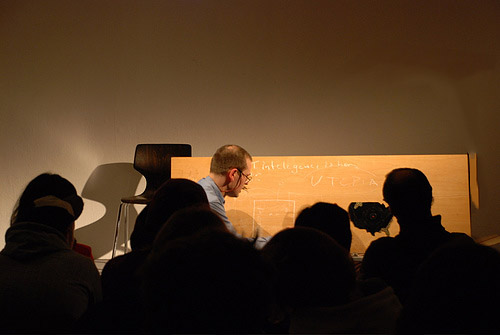Education Networking Day

The Education Networking Day invites students, professors, and researchers from different graduate and posgraduate programs that straddle different fields such as audio, arts, media, and design, and related theoretical disciplines, to present their programmes, projects, and research focus in 30 to 60 minute sessions. In addition to graduate and postgraduate students, the program is open to institutes and academies whose students have already made their first steps towards a professional or artistic practice.
Presentation Schedule
13:00 Presentation of the European Media Studies Potsdam
Anne Quirynen and Simon Vincent - professors
The European Media Studies (EMSW) course is a co-operative project between the University of Potsdam and the University of Applied Sciences Potsdam. Anne Quirynen (Professor of Moving Image) and Simon Vincent (Lecturer in Sound and Composition) present two outstanding projects:
The Syntopic Salon: a 6-month exhibition located at Neues Palais, Potsdam, which displays performance and installation-based works created by EMSW students.
The EMSW Orchestra: an experimental audio-visual “body” that tests the boundaries of performance spaces with an impressive repertoire.
13:30 Research Presentation
Annika Haas - Student of European Media Studies Potsdam
With her sound installation, "…zur Berührung", Annika Haas explores the auditive dimensions of touch. Haas gives an insight into her research, at the threshold of aesthetic philosophy and artistic practice.
13:55 Hackteria
Denisa Kera and Stefania Druga - hackteria.org
Denisa Kera and Stefania Druga will discuss strategies and examples of how to bridge the formal and informal setting of knowledge exchange and production, and introduce their work in developping a network that supports research in developing countries (Indonesia, Nepal). Geek Diplomacy brings together thinkers, hackers, makers, and inventors from around the world to embrace open science and democratic exchanges of technologies.
14:15 Pause
14:35 Presentation of the Media Arts & Design Programme
Prof. Ursula Damm, Prof. Nathalie Singer, and Ludger Henning - Bauhaus Universität, Weimar
Prof. Ursula Damm, Prof. Nathalie Singer, Ludger Henning and their colleagues present the Media Arts & Design programme at the Bauhaus Universität Weimar. The programme consists of a course in artistic studies within an interdisciplinary context. Within the Transfer Education Networking Day they give an overview of the University’s new media facilities, as well as examples of current student projects within the fields of “Media Environment”,”Electroacoustic Composition and Sound Design”. and “Experimental Radio”.
15:15 Terra Prosodia
Antje Vowinckel – artist, Berlin
Antje Vowinckel will introduce her project, “Terra Prosodia”, a series of electro-acoustic compositions based on European dialects and endangered languages. The project focuses on the musicality of spoken word and the unique melodies that are typical for each dialect/language. (WDR 2011, honorary mention Prix Ars Electronica Linz, supported by Medienstiftung NRW)
15:45 The Way Things May Go
Alberto de Campo and Hannes Hoelzl - UdK Berlin, RSH Duesseldorf HfK Bremen
Alberto de Campo and Hannes Hoelzl will give an introduction to the installation "The Ways Things May Go", curated as part of the CTM.13 Exhibition. The installation is a meditation on invented causality in a networked world, and was realised as a collaboration between four participating universities: UdK Berlin, HfK Bremen, RSH Duesseldorf and Angewandte Vienna. The project’s primary initiators, Hannes Hoelzl and Alberto de Campo, will discuss the background and the working process that evolved in the project shown in the CTM.13 exhibition.
16:05 Pause
16:50 Re-imagining Living Room Particle Accelerators
Darsha Hewitt - Perte de Signal, Montreal
Darsha Hewitt, member of Montreal’s Perte de Signal arts center, talks about her project, “Reimagining Living Room Particle Accelerators”. As the sleek flat-screen monitor has enchanted its way into the home, in its wake it has left an abundance of once-noble cathode ray tube TVs. Documentation of in-studio experiments and hands-on demonstration illustrate how this obsolete technology can be reinvented to generate raw material for artistic expression.
17:15 Synthesthesia
Aurelie BessonAlexandre Quessy – Perte de Signal, Montreal
Alexandre Quessy, member of the same Montreal arts centre, presents “Synthesthesia”, a workshop and software program developed by Perte de Signal, in which participants are invited to create visual audio compositions with simple materials such as white paper and a black background. The shapes detected by a camera and control audio parameters such as pitch, amplitude, and spectrum.
17:45 Electronic Production and Design
Michael Bierylo - Berkleey College of Music, Boston
Michael Bierylo presents Berklee’s Electronic Production and Design Department. The department prepares undergraduate students for careers as electronic artists, industry professionals, as well as laying the foundation for graduate level research. Students have the opportunity to work in collaborative environments to explore software development and all aspects of computer music and video performance using innovative music production and sound design techniques.
18:15 Pause
18:35 The Arts Technology Research Lab (ATRL)
Sharon Phelan and Cobi van Tonder - School of Drama, Film and Music, Trinity College, Dublin
Sharon Phelan and Cobi van Tonder introduce the “Arts Technology Research Lab” (ATRL). In partnership with the Digital Arts and Humanities PhD Programme, the ATRL provides an environment for interdisciplinary, practice-based researchers to explore emergent fields of creative arts practice and new technologies. Phelan and van Tonder – ATRL scholars in the fields of sound art and composition – will give an overview of the programme and discuss their current research.
19:10 Contemporary Arts Practice
Valerian Maly - Bern University of the Arts, Bern
Valerian Maly from Bern University of the Arts introduces the Masters programme in Contemporary Arts Practice. The interdisciplinary schedule involves Fine Arts, Music, Literature, and Performance Art in both theory and praxis, transgressing medial and disciplinary boundaries.


